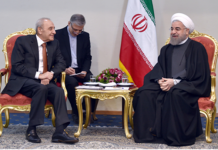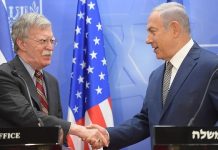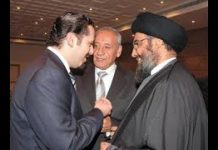Home تعليقات ومقالات مميزة أمير طاهري: الانتخابات اللبنانية والمجداف المكسور/Amir Taheri: Lebanese Election and the Broken...
Lebanese Election and the Broken Oar
Amir Taheri/Asharq Al-Awsat/May 13/2022
الانتخابات اللبنانية والمجداف المكسور
أمير طاهري/الشرق الأوسط أونلاين»/13 أيار/2022
يبدو في حكم المؤكد أن الانتخابات العامة اللبنانية ستستحوذ على اهتمام واسع، لكن ما الذي تعنيه هذه الانتخابات؟
هل هي خطوة للخروج من متاهة البؤس والرعب التي تَحمّلها اللبنانيون لسنوات أم خطوة نحو التعميق فيها؟
من جهتها، تنظر وسائل الإعلام في طهران إلى الانتخابات اللبنانية بوصفها «استفتاءً على المقاومة»، وتتوقع تأييداً ساحقاً للدور الذي رسمه «المرشد الأعلى» للجمهورية الإسلامية علي خامنئي للبنان، وحاول فرضه من خلال جماعة «حزب الله» وتحالف بينها وبين فصيل ماروني بقيادة الرئيس ميشال عون.
وسعياً وراء الفوز في ذلك الاستفتاء، أصدرت طهران الشهر الماضي شيكاً بقيمة 25 مليون دولار «مساعدة إضافية» لزعيم «حزب الله» حسن نصر الله.
وجرى جمع المزيد من الأموال من خلال عدد من الحفلات الموسيقية التي نظّمها ملالي الجمهورية الإسلامية، ودعوا إليها كذلك «المؤمنين» كي يفتشوا في جيوبهم عن أموال لمساعدة «حزب الله» وحلفائه داخل جميع المجتمعات اللبنانية على تحقيق «فتح مبين». وجرى تصوير نصر الله بوصفه نسخة كاريكاتيرية لخامنئي الذي هو نفسه صورة كاريكاتيرية من الراحل الخميني.
في المقابل، يأمل نجيب ميقاتي، رئيس الوزراء، أن تقنع الانتخابات صندوق النقد الدولي بالتوقيع على شيكه الموعود بقيمة 5 مليارات دولار في صورة «مساعدات طارئة». من جهته، يحلم الرئيس عون، وهو نفسه أقرب لصورة كاريكاتورية للجنرال ديغول لكن في حجم أصغر، بتأسيس عائلة حاكمة من خلال صهره (جبران باسيل) المتحمس بدعم من طهران.
ويتحدث بعض المتفائلين، بمن فيهم عدد قليل من المبتدئين الذين دخلوا حفرة السياسة كمرشحين، عن «فرص جديدة» من شأنها أن تسمح للبنان بإعادة تصميم اقتصاده من طريق وضع بيروت تحت إدارة دولية، وتحويل لبنان إلى مركز نقل وتجارة إقليمي من خلال بناء خط سكة حديد بين بيروت ووادي البقاع، وبعد الحصول على دعم من صندوق النقد الدولي والبنك الدولي، سيصبح باستطاعة لبنان العودة إلى الأيام الخوالي عندما كان لبنان ذو المساحة الضئيلة نقطة جذبٍ للاستثمارات الإقليمية والدولية.
ومع ذلك، فإن الكثير من المحللين يرفضون الأمر برمّته، بوصفه ممارسة عبثية ستعمّق المتاهة التي يوجد بها لبنان وتُبقيه تحت قيادة ذات الأشباح التي أغرقت أكثر من 70% من اللبنانيين في براثن الفقر. بعبارة أخرى، ستتكرر الأحداث نفسها داخل البلاد إلى ما لا نهاية.
في الواقع، نحن على يقين من أننا سنجد أنفسنا أمام الشخصيات نفسها. على سبيل المثال، من المؤكد أن نبيه بري الذي يشغل منصب رئيس مجلس النواب منذ 30 عاماً، سيعود إلى مقعده.
كما سيحتفظ الزعيم الدرزي وليد جنبلاط بدوره المألوف الأشبه بدوارة الرياح التي تكشف اتجاه الريح، في الوقت الذي يواصل المجتمع السني دوامة الانحدار في براثن النفوذ السياسي والسلطة.
وعليه، هل ينبغي رفض الانتخابات برمّتها كما يفعل المحللون المذكورون أعلاه؟
في الواقع، من المحتمل أن يتضح وهمُ شيكِ صندوق النقد الدولي، مثلما حدث مع ورقة الدفع أو الكمبيالة البالغ قيمتها 11 مليار دولار عام 2018، خصوصاً أن تشكيل حكومة جديدة من المحتمل أن يستغرق وقتاً أطول. والاحتمال الأكبر أن المشروعات الكبرى الخيالية، مثل إحياء ميناء بيروت وبناء مركز للسكك الحديدية ورفع بنك لبنان من أجهزة التنفس الصناعي، ربما لا تتجاوز جلسات الدردشة بعد مآدب العشاء.
الحقيقة أن مشكلة لبنان في جوهرها جيوسياسية، بمعنى أن أولئك الذين يمسكون بزمام السلطة ينظرون إلى البلد بوصفه إما مخبأ حصين وإما منطقة جليدية تتفوق فيها مصالح قوى خارجية على مصالح الدولة الوطنية.
والأسوأ من ذلك أن أولئك الذين يمارسون السلطة أثبتوا افتقارهم إلى الكفاءة على نحو كامل، ناهيك بفسادهم، لما يقرب من عقدين من الزمن. كما أثبت «حزب الله»، الذي يدّعي حق النقض في جميع التعيينات والقضايا الرئيسية، عجزه عن ضمان الأمن حتى داخل قاعدة دعمه الرئيسية في جنوب بيروت والتي يطلق عليها الآن اسم «الغرب الشيعي المتوحش»، حيث حتى السياح الإيرانيون النادرون ينصحون بعدم المغامرة بالدخول إليها من دون توافر «الحماية المناسبة» لهم.
وإلى جانب مشكلة لبنان الجيوسياسية، علينا أن نضيف السياسات الممنهجة لتقويض المؤسسات التي نفّذها «حزب الله» على مدى عقود. ويعني هذا أن جميع مؤسسات الدولة العادية قد تحولت إلى قذائف جوفاء، في الوقت الذي تتركز عملية صنع القرار الحقيقي في مكتب خامنئي في طهران. وما يزيد الأمور تعقيداً، أن لدينا الآن بشار الأسد، حاكم دمشق العنيد الملطخ بالدماء، والذي يسعى إلى العودة إلى الساحة اللبنانية، وإن كان ذلك كأداة في أيدي ملالي إيران. وفي زيارة خاطفة له لطهران، حاول الأسد الحصول على موافقة خامنئي بتولي واحد من حلفاء السوريين السابقين كرئيس جديد للبنان.
هل الاحتمالات تبدو قاتمة؟
نعم بالفعل، ومع ذلك، حتى الانتخابات الرديئة تبدو أقل سوءاً من عدم إجراء انتخابات من الأساس. إن حقيقة دخول الكثير من الوجوه الجديدة، بما في ذلك النساء والناشطون السياسيون الشباب الجدد، إلى الحلبة أمر مشجع، رغم أنَّ الاحتمالات تشير إلى فوز عدد ضئيل منهم فقط.
والأهم من ذلك، أن النخبة اللبنانية الحاكمة تدرك أنها فقدت شرعيتها السياسية والمذهبية.
بيد أنه رغم هذا الاحتمال القاتم، فإن اليأس يبقى غير مبرر.
لقد زرعت انتفاضة 2019 الشعبية بذوراً لا بد أن تنمو في الوقت المناسب. من الناحيتين الجيوسياسية والاقتصادية، يظل لبنان قطعة ثمينة من العقارات تطل على البحر الأبيض المتوسط. وحاول الكثير من الطغاة في المنطقة تحويله إلى مخبأ لخططهم المظلمة، إلا أنهم جميعاً فشلوا، بينما نجح لبنان في زحزحتهم واستعادة السيطرة على مصيره. ولا يوجد سبب يمنع تكرار نفس نمط التحرر في الوقت المناسب، وتقليص حجم هذه الانتخابات لتصبح مجرد ملحوظة هامشية في كتاب تاريخ.
الواضح أن الصورة الكبرى في المنطقة لا تميل لصالح من يمارسون القمع بحق لبنان، فالنظام الخميني يغرق فيما يمكن أن يتحول إلى أزمة سياسية واقتصادية قاتلة. ومع سقوط روسيا في مستنقع أوكرانيا، قد يتحول حلم عائلة الأسد بالعودة إلى لبنان كلاعب كبير، إلى كابوس بالنسبة لهم.
وبغضّ النظر عن النتائج التي يرجّح أن تكون «مرتبة»، فإن انتخابات الأحد قد تتحول إلى استفتاء على المقاومة، ومقاومة اللبنانيين ضد القوى التي تحاول نزع اللبنانيين عن بلادهم.
وبوصفهم بحّارة جسورين، عرف الفينيقيون القدماء، أسلاف اللبنانيين، كيف يتغلبون على أكبر العواصف مع الحفاظ دوماً على أمل العودة إلى ساحل صور.
وكان للبحار الفينيقي القديم صلاة يتلوها كتعويذة: «يا إلهة صور، أم قرطاج! ها أنذا أسلم مجدافي!»
ودائماً ما كانت الإلهة تأخذ المجداف المكسور وتعطي البحار آخر جديداً لمواصلة رحلته بأمان.
Lebanese Election and the Broken Oar
Amir Taheri/Asharq Al-Awsat/May 13/2022
A general election in Lebanon is bound to be news if only because it is years overdue.
But what is it for?
Is it a step towards the exit from the maze of misery and terror that the Lebanese have endured for years or a step deeper into it?
The Tehran media see the Lebanese election as “a referendum on the Resistance” and expect a resounding endorsement of the role that the Islamic Republic “Supreme Guide” Ali Khamenei has scripted for Lebanon and tried to impose through a branch of his Hezbollah in alliance with the breakaway Maronite faction led by President Michel Aoun.
To win that referendum, Tehran last month wrote a $25 million cheque in “ extra help” for Hezbollah leader Hassan Nasrallah.
More money was raised through a number of concerts in the Islamic Republic mullahs where also invited “the believers” to dig into their pockets to help Hezbollah and its allies in all Lebanese communities secure “a glaring victory” (fath al-mobin). Nasrallah was portrayed as a caricature of Khamenei who is himself a caricature of the late Khomeini.
In contrast, Najib Miqati, the ephemeral Prime Minister in place, hopes that the election would persuade the International Monetary Fund (IMF) to sign its promised cheque of $5 billion in “emergency aid”. For his part, President Aoun, a caricature of General De Gaulle in reduced size, dreams of founding a dynasty through his ebullient son-in-law with support from Tehran.
Some optimists, including a few novices who have entered the mud-hole as candidates, talk of “new opportunities” that would allow Lebanon to redesign its economy by putting Beirut under international management, turning Lebanon into a regional transport and trade hub by building a railway between Beirut and the Bekaa Valley and, having secured support from IMF and the World Bank, return to the good old days when tiny Lebanon was a magnet for regional and international investment.
Many analysts, however, dismiss the whole thing as an exercise in futility that is bound to deepen the maze and keep it populated by the same ghouls and ghosts that have plunged over 70 percent of the Lebanese into poverty. In other words, we are going to have a political version of “Last Year in Marienbad” in which the same events are repeated ad infinitum.
According to them, we are certain to get the same cast of characters: Nabih Berri, who has been Speaker of Parliament for more than half of Lebanon’s existence, is sure to be back in his soiled seat.
The Druze chief, Walid Jumblatt, will retain his role as a weathervane, while the Sunni community will continue its downward spiral in germs of political influence and power.
So, should one dismiss the whole thing as the above-mentioned analysts do?
The IMF cheque is likely to turn out to be as imaginary as the promissory note of $11 billion was in 2018 if only because forming a new government is likely to take even longer. Pie-in-the-sky projects such as reviving the Beirut port, building a railway hub, and removing Bank of Lebanon from the life-support machine may never go beyond after-dinner talks.
Lebanon’s problem is fundamentally geopolitical in the sense that those who hold the reins of power regard the country either as a bunker or a glacis where the interest of outside powers trump those of the nation-state.
Worse still, those who exercise power have proved their utter incompetence, not to mention their corruption, for almost two decades. Hezbollah, which claims a veto-power on all key appointments and issues, has proved incapable of even ensuring security in its main support base in southern Beirut which is n ow dubbed as “the Shiite wild west” where even the rare Iranian tourists are advised not to venture without “proper protection.”
To Lebanon’s geopolitical problem we have to add the systemic de-institutionalization carried out by Hezbollah for decades. This means that all normal state institutions have been turned into hollow shells, while real decision-making is centralized in Khamenei’s office in Tehran.
To complicate matters further, we now have Bashar al-Assad, the bloodied-but-unbowed ruler of Damascus, who seeks a return to the Lebanese scene albeit as second violin to Iranian mullahs. In a lightning visit to Tehran, he tried to get a nod from Khamenei for one of Syria’s former lieges as the next Lebanese president.
A bleak prospect?
Yes, indeed. Nevertheless, even a bad election is less bad than no election. The fact that so many new faces, including women and young new political activists, have entered the ring is encouraging, although few are likely to slip through to victory.
More importantly, the Lebanese ruling elite know that they have lost whatever legitimacy they had in political and confessional terms.
Despite the grim prospect, despair is not warranted.
The 2019 popular uprising has sown seeds and that are bound to grow in time.
In both geopolitical and economic terms, Lebanon remains a valuable piece of real estate on the Mediterranean. Various Arab despots tried to turn it into a bunker for their dark designs or a beach for their capricious sorties. All failed while Lebanon succeeded in shaking them off and regaining control of its destiny.
There is no reason why the same pattern of release from oppression cannot be repeated in time, downsizing this election into a footnote in history.
The bigger picture in the region does not favor Lebanon’s oppressors. The Khomeinist regime is plunging into what could turn out to be a fatal political and economic crisis. With Russia bogged down in the Ukraine quagmire, the Assad clan’s dream of returning to Lebanon as a big player may turn out as a nightmare for them.
Regardless of the results, likely to be “ arranged”, Sunday’s election may yet turn out to be a referendum on resistance, the resistance of the Lebanese people against forces that try to de-Lebanize their country.
As daring seafarers, the ancient Phoenicians, ancestors of the Lebanese, knew how to weather the biggest storms while always keeping alive the hope of return to the coast of Tyre. The ancient Phoenician seafarer had a prayer as his talisman: “Oh, Goddess of Tyre, Mother of Carthage! I surrender my oar!”
The Goddess always received the broken oar and gave the seafarer a new one to safely continue his voyage home against the storms.






















